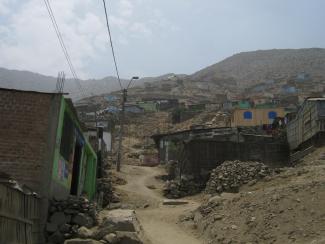Multilateral affairs
Global stability

The message from Lima is that all countries must act. They were told to make voluntary commitments. Experts will assess ahead of Paris whether everything combined will suffice to keep global warming below 2 degrees. If not, additional commitments will be needed.
The approach taken in Lima follows the example of the deal struck by the USA and China ahead of the summit, with Washington pledging to reduce emissions at a certain rate and China indicating when its emissions will peak. This suits the principle of differentiated responsibility as national circumstances are taken into account.
An upside of the Lima document is that all countries are not only told to act, but to do more than in the past. As the voluntary commitments will probably not suffice, however, Paris will see serious clashes of interest.
At the root of the problem is that climate policy did not work out as envisioned at the Earth Summit in Rio de Janeiro in 1992. The original strategy had two parts:
- Advanced economies would decarbonise, and their future growth would be based on new climate-friendly infrastructure and technology. By reducing carbon emissions they would vacate “atmospheric space” for emissions from developing countries.
- Developing countries’ emissions would keep rising for a while, but their economies would leapfrog to green options, so growth would become clean. The developing world was not supposed to copy the rich world’s historic model.
The strategy did not work out. The Kyoto protocol did not vacate much atmospheric space. Some countries such as Germany and Britain lived up to their obligations, others such as Spain, Canada or Australia failed utterly. The USA did not even ratify its Kyoto pledges. All in all, rich-nation emissions have only gone down marginally.
It matters even more that growth in emerging markets followed the high-emission example set by the rich world. Yes, emerging markets take serious interest in renewable energy, but they are far from decarbonising. In contrast to what was envisioned in 1992, economic growth still means more emissions in most places today. Lima has spelled out in useful clarity that all countries must do more to change this pattern.
However, there is no clarity concerning climate finance. It is obvious that advanced nations can afford more spending than emerging economies, and that rising giants can afford more than least developed countries. The rich nations are under particular pressure. In Copenhagen five years ago, they pledged to make available an annual $ 100 billion to assist climate mitigation and adaptation in less advantaged countries from 2020 on. However, they have not said how they will live up to that pledge. Their failure to fulfil decades-old promises to increase official development assistance is not reassuring, and their tendency to confound climate finance with ODA does not help.
If the rich world wants Paris to succeed, it should announce convincing finance models soon. Private-sector investments can play an important part, but so must public-sector spending. Perhaps governments will have to increase their budget deficits. Whether at home or abroad, climate mitigation and adaptation are worthy causes for taking loans, even in times of stretched public finances. Money spent domestically, may actually boost the national economy.
Economics is a social science marked by controversial debate. It offers a variety of models concerning business cycles. Orthodox economists warn that deficit-spending to stimulate an economy only has short-term effects. Their Keynesian colleagues, in contrast, expect deficit-spending to kick-start recovery.
The real issue at stake, however, is not whether stimulus works. The natural-science models of the climate are absolutely unambiguous. Our planet’s ecological balance cannot be maintained unless the climate is protected fast and effectively. For this purpose, huge investments are needed fast. No matter what economic theory one finds convincing, it is absolutely clear that humankind will neither enjoy economic nor political stability without stabilising the climate.
Hans Dembowski is editor in Chief of D+C/E+Z.
euz.editor@fs-medien.de








